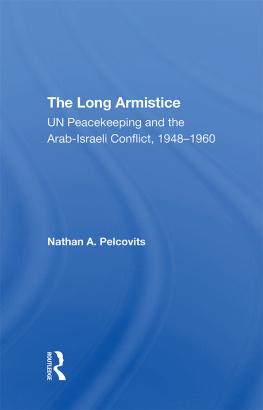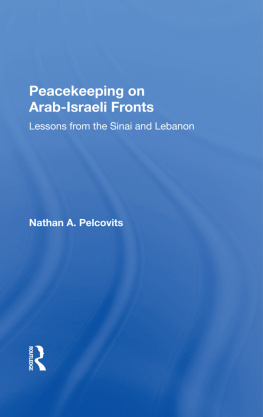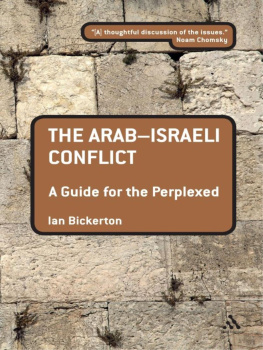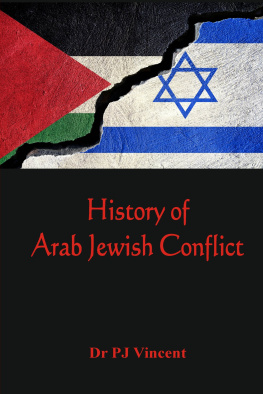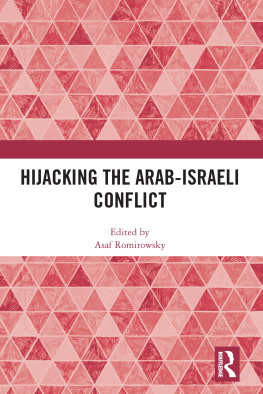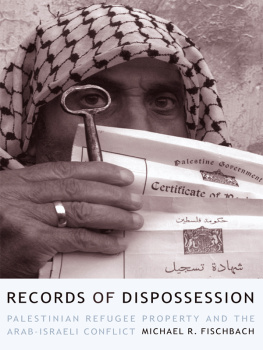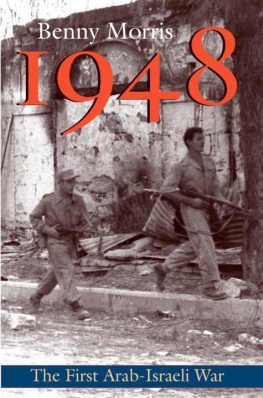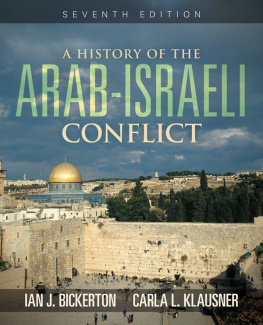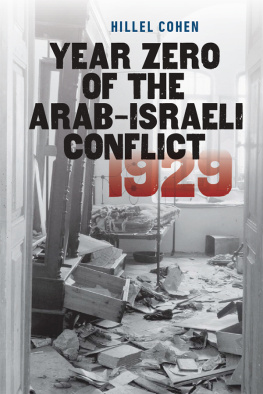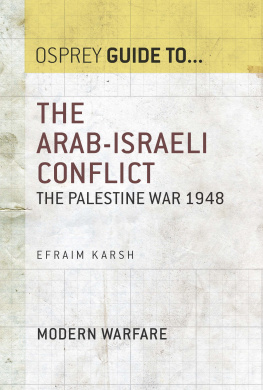The Long Armistice
Published in cooperation with the Moshe Dayan Center for Middle Eastern & African Studies, Tel Aviv University
The Long Armistice
UN Peacekeeping and the Arab-Israeli Conflict, 19481960
Nathan A. Pelcovits
First published 1993 by Westview Press, Inc.
Published 2019 by Routledge
52 Vanderbilt Avenue, New York, NY 10017
2 Park Square, Milton Park, Abingdon, Oxon OX14 4RN
Routledge is an imprint of the Taylor & Francis Group, an informa business
Copyright 1993 Taylor & Francis
All rights reserved. No part of this book may be reprinted or reproduced or utilised in any form or by any electronic, mechanical, or other means, now known or hereafter invented, including photocopying and recording, or in any information storage or retrieval system, without permission in writing from the publishers.
Notice:
Product or corporate names may be trademarks or registered trademarks, and are used only for identification and explanation without intent to infringe.
Library of Congress Cataloging-in-Publication Data
Pelcovits, Nathan A. (Nathan Albert), 1912
The long armistice: UN peacekeeping and the Arab-Israeli
conflict, 19481960 / Nathan A. Pelcovits.
p. cm.
Includes bibliographical references (p.) and index.
ISBN 0-8133-8483-4
1. Jewish-Arab relations19491967. 2. United Nations
Palestine. 3. United NationsArmed ForcesMiddle East.
4. Israel-Arab War, 19481949Armistices. 5. Sinai Campaign, 1956.
DS119.7.P443 1993
956.04dc20 93-19519
CIP
ISBN 13: 978-0-367-29362-8 (hbk)
Contents
, Samuel W. Lewis
A FEW MONTHS AFTER I arrived in Israel as U.S. ambassador in 1977, I delivered a speech in Haifa. The date coincidentally fell during the week in which, thirty years earlier, the United Nations General Assembly had cast a fateful vote to endorse the partition of Palestine into separate Jewish and Arab states. The audience was shocked when I used the occasion to laud the United Nations. I recalled the crucial role the UN had played in smoothing the legal path to Israel's rebirth as a sovereign member of the community of nations. I was taken aback by the vehemence of the reaction. By the time my ambassadorship ended eight years later, I understood much more about the highly suspicious Israeli view of the UN and had frequently tried, with little success, to temper it. But I never fully grasped its origins until I read the manuscript for this book.
It is a seeming paradox that a state that owed its legitimacy to the UN should have become so bitterly estranged from the international organization, an estrangement that is finally beginning to fade in the 1990s. Understanding the nature of the paradox is essential if one is to comprehend fully the tangled history of the Arab-Israeli conflict and the course of Israel's often tumultuous relationship with its major friend and ally, the United States.
The UN has been centrally involved in the "Palestine problem" since its earliest days, as mediator, as would-be peacemaker, as peacekeeper, and as a forum for endless debate over questions that have occupied the General Assembly and the Security Council more than nearly all other issues combined. During the 1970s and 1980s, seemingly endless assaults on Israel in various UN arenas by Arab delegations, their "nonaligned" colleagues, and Soviet-bloc representatives were unrelenting threatening on more than one occasion to force Israel's suspension or expulsion from the General Assembly itself or from other UN bodies.
Milestones in this persistent campaign to destroy Israel's legitimacy were the General Assembly's adoption of the so-called "Zionism is racism" resolution in November 1975, finally repealed as late as 1991, and the Security Council's refusal to endorse or even commend the achievement of full peace between Israel and Egypt in 1979. Had the United States not defended Israel's position so stoutly in the world organization throughout these years, Israel would likely have become permanently estranged and probably would have been expelled.
This book provides a much-needed history and analysis of the origins and early period of Israel's bitter, mutual distrust of the UN. It fills an important gap in the history of the Middle East. Dr. Pelcovits draws on a rich background of U.S. government experience in UN affairs to enrich his careful scholarship. He brings to his task an excellent blend of the perspectives of both practitioner and analyst. The story has multiple strands, and Pelcovits separates them carefully and objectively. He correctly dispels a widely held impression that the problem stemmed largely from conflict between individual Israelis and UN officials, personal chemistry, or contrasting political cultures. Rather, the persisting mutual mistrust stemmed originally from a clash between what Pelcovits calls "Israel's security ethos and the UN's peacekeeping ethos." Pelcovits finds that Israeli officials believed that UN representatives and its peacekeepers were not alert to Israel's security concerns, that their attitudes fluctuated between an unsympathetic detachment and judgmental partisanship.
Ultimately, all parties, including Israel, accommodated to a stalemated armistice regime monitored by UN peacekeeping units, but in the process Israelis came to regard the UN as part of their problem rather than a vehicle for achieving a. satisfactory peaceful solution. That attitude persisted for several decades, hardening into bitter hostility in the 1970s and 1980s as the Arab diplomatic offensive against Israel in UN bodies reached a crescendo.
How the conflict began and how it evolved is a fascinating, if depressing, story. Pelcovits has gotten to the core of the problem in this volume.
Samuel W. Lewis
U.S. Ambassador to Israel, 1977-1985
IN WRITING THIS BOOK I drew mainly on two sources: the diplomatic record, both published and archival, and conversations with officials, diplomats, military officers, scholars, and writers in the United States and Israel, many of whom witnessed or participated in the events here recounted.
Three documentary collections were primary: (1) the United Nations archives, through which I was guided by Harmut Hagner, chief of reference services; (2) the Israel State Archives in Jerusalem, where I was helped by Gilad Livne; and (3) the Central Files of the Department of State, housed at the National Archives in Washington, D.C. The voluminous U.S. material proved most valuable, reflecting Washington's pivotal role in the Arab-Israeli confrontation. The key documents, especially on the Suez-Sinai crisis of the mid-1950s, have recently been published in the State Department's series, Foreign Relations of the United States . For other periods, the unpublished papers still in the archives remain a principal source. Because the Arab state documents were not accessible to me, I came to depend heavily on the U.S. and UN documents and the scholarly literature for an understanding of Arab positions.
The many conversations I had with witnesses and participants in the events, and their willingness to speak candidly and at length, gave meaning to the historical record. What the interviews added to the tale was a retrospective evocation of how reality was viewed at the time as well as a clarification of the impact on the present.
Of the many people with whom I talked, particular gratitude is owed to several: Sir Brian E. Urquhart, the leading practitioner and philosopher of UN peacekeeping, for his penetrating and candid comments; Walter Eytan, the director-general of Israel's foreign ministry during the formative period, who was present during many of the events here recounted; Aryeh Shalev of the Jaffee Center for Strategic Studies at Tel Aviv University, whose experience and understanding of Israel's policies toward the Mixed Armistice Commissions helped focus my analysis; Mordechai Gazit, scholar and seasoned diplomat, who helped me sharpen the analysis of motivations; and Yehoshafat Harkabi of the Hebrew University, a participant at the Rhodes armistice talks in 1949 and leading military and political strategist in Israel for the past forty years.


